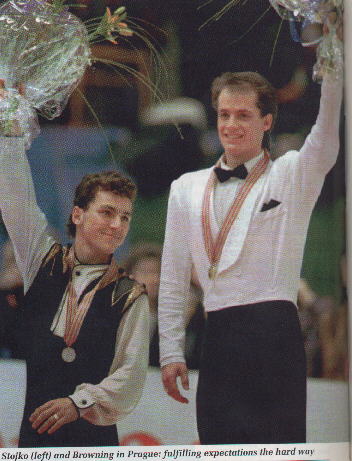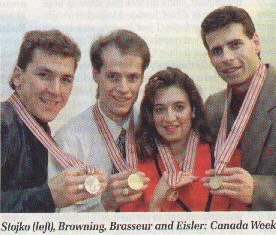|
On top of the world: Canadian skaters claim gold in Prague
| Source: |
Maclean's, v106 n12 p44(2). |
| Date: |
March 22, 1993 |
| Author: |
James Deacon |
| Abstract: |
Canadian skaters captured three gold medals at the 1993 World Figure Skating Championships. Kurt Browning won the men's program and Isabelle Brasseur and Lloyd Eisler won the pairs program. Elvis Stojko took the silver in the men's program. The reputation of Canadian skaters is improving. |
Full Text COPYRIGHT Maclean Hunter (Canada) 1993
When they finally came to rest following their long program at the World
Championships last week, Canadian pairs skaters Isabelle Brasseur and Lloyd
Eisler melted into an exhausted embrace. It had been a stirring--and
nerve-wracking--performance that had the fans at the 12,000-seat Sportovni
Hale in Prague, Czech Republic, on the edge of their seats for every lift,
throw and side-by-side jump. It was also an intimate program, significant
after an unusually difficult year. Prague was their chance to mitigate the
disappointment of third-place finishes at the 1992 Winter Olympics and World
Championships--and to help ease Brasseur's grief over the death of her father
last November. Certainly, he was close to their hearts when they concluded
what, ultimately, was a gold-medal performance. As the music gave way to
thunderous applause, Eisler hung his head for a second, then took Brasseur's
hand, kissed it and said, ``That's for your Dad.''
By capturing the championships' first gold medal, Brasseur and Eisler launched
what seemed like Canada Week in Prague. Kurt Browning and Elvis Stojko
fulfilled everyone's expectations, winning the men's gold and silver medals,
respectively. In addition, Canada placed two other couples in the top 10 in
pairs--Michelle Menzies of Cambridge, Ont., and Jean-Michel Bombardier of
Laval, Que., less than a year into their partnership, finished seventh, and
newcomers Jodeyne Higgins of Stratford, Ont., and Sean Rice of Oakville, Ont.,
placed 10th. But it was Kurt and Elvis who stole the show with dramatic,
spectacular free skating routines that left them both clearly ahead of a
24-man field that included Marcus Christensen of Edmonton, who placed 10th in
his first Worlds. In the women's event, Karen Preston, 21, of Mississauga,
Ont., and Josee Chouinard, 23, of Laval, Que., finished eighth and ninth,
respectively. For Chouinard, ninth was a disappointment: she was fifth last
year, and had placed fourth in the short program.
With the 1994 Winter Games less than a year away, the Canadians did much to
enhance their reputations. And skating officials privately acknowledge that
international judging is often biased towards reputation. That seemed evident
last Friday night when newcomer Oksana Baiul, a spindly 15-year-old Ukrainian,
won the audience's vote in the women's technical program, but was placed
behind Nancy Kerrigan of the United States. Baiul came back the next night,
however, and won gold with the field's best artistic marks for her free skate.
Erratic judging also seemed apparent when Preston finished eighth after
placing seventh in both the technical and free skating. ``Nancy Kerrigan did
two triples and is still ahead of me? You've got to question that,'' said
Preston, who landed six triples. ``It's frustrating. But, what can you do?''
By overcoming a disheartening 1992, Brasseur and Eisler led the way for the
rest of the Canadian team. Eisler, 29, from Seaforth, Ont., had been paired
with Brasseur, 22, from St-Jean-sur-Richelieu, Que., since 1987. After winning
silver at the 1990 Worlds, they began to feel the weight of high expectations,
and succumbed to untimely miscues. That convinced them to redesign their
program with an emphasis on the artistry. It paid off. ``The gold medal is a
reward for a performance that meant everything to us,'' said Eisler. ``We
didn't skate a perfect program, but the performance we were looking for was
there.''
If Brasseur and Eisler were the heart of the Canadian team, Browning and
Stojko were the competitive muscle. Pre-championship speculation declared them
to be the class of their field, and Browning did little to dispel that notion
when he skated a solid short program and established the marks to beat. But
the one-two Canadian punch lost a lot of its impact when Stojko, from Richmond
Hill, Ont., skated an uncharacteristically poor technical program and finished
fifth on the first night of competition. The 20-year-old was morose
afterwards: as his marks were announced, he stared at the scoreboard, the
rugged features of his face strangely slack. Things got worse later that
evening when Stojko fell ill while eating dinner at a Prague restaurant. His
girlfriend, Kim Currie of Barrie, Ont., had to help him walk back to his hotel
where he was confined to bed and treated by a team doctor. ``I don't know what
it was,'' Stojko said the next day. ``Maybe the stress--it gets pretty
stressful out there.''
But Stojko took solace from Don Jackson, the first Canadian to win a world
men's title, in Prague in 1962. Jackson, who attended this year's
championships as a guest of the organizers, reminded Stojko that he too had
placed fifth after his short program and still rebounded with a stunning free
skate. So Stojko set his sights on silver: ``I got a little angry with myself
and I said, `Geez, Elvis, this is not the place to be doing this. You've got
to go out there and redeem yourself and you've got to do it now.' ''
 |
He did, by performing the event's most difficult routine with remarkable ease.
Stojko landed every one of his eight triples, including a difficult triple
Axel-triple toe loop combination. ``Each element was really clear-cut,'' said
his coach, Doug Leigh. ``It was really first class all the way.'' On technical
merit alone, Stojko had won the day. But technique is only one part of how the
sport is judged, and the judges gave less credit for his artistic
interpretation.
Not so with Browning. The 26-year-old Caroline, Alta., native took what he had
learned from winning three previous world titles and produced four-and-a-half
minutes of theatre on ice. A superb technician in his own right, Browning is
also an accomplished showman. At his best, he can be Fred Astaire in a field
of Fred MacMurrays. Skating to the theme of the movie classic Casablanca,
Browning became Bogie, striding through the mysterious back streets of wartime
Morocco. In pollution-ravaged Prague, that was a considerable
stretch--particularly for those willing to accept a Bogie who did triple Axels
and combination jumps. But the audience was swept along for the ride, and when
the music died, many fans called for him to play it again. |
Like Brasseur and Eisler, Browning had something to prove in Prague. A lower
back injury curtailed his training before the 1992 Winter Olympics, and the
pain dogged him throughout the Games. The defending World champion finished
sixth. But he decided to hang on for next February's Winter Games in
Lillehammer, Norway. There was no guarantee that he would be able to avenge
his 1992 disappointment. In fact, he hurt his hip three weeks before the
Worlds that left him unable to practise some jumps. ``I looked around all week
and saw what everybody was doing, and I knew I hadn't been able to train to
that technical level of skating,'' said an elated Browning after the medal
ceremony. ``So it was important to make sure that this program was the
best-skated program out there tonight.''
Many of the Canadian skaters finished well back of the medallists, but still
considered Prague a success. Shae-Lynn Bourne, 17, of Chatham, Ont., and
Victor Kraatz, 21, of Qualicum Beach, B.C., said that they were pleased with
their 14th-place finish in ice dancing. The pair have been skating together
for only a year, and the Worlds were their first major international
competition. And Preston, despite her placement, was happy with her
performance. ``Last year at the Olympics, I only tried six triples and this
year I raised the technical difficulty by putting two triples back to back at
the 3:45 mark,'' said Preston. ``So, I'm very pleased. It shows I've
improved.''
|
With the medals still slung around their necks, the skaters were already
setting their sights on the 1994 Winter Olympics. Traditionally, they would
gauge the competition on the World Championships--but the 1994 Winter Games
will allow some professionals to compete. Nonetheless, skating experts view
the return of professionals with suspicion, and suggest that few have stayed
fit enough to compete at the Olympic level. And according to former Canadian
ice dancer Tracy Wilson, currently a CBS skating analyst, the performances at
Prague could dissuade many amateurs as well. Wilson cited Ukrainian skater
Viktor Petrenko, the 1992 World and Olympic champion who is considering a
comeback. She added: ``The performance that won Petrenko the Olympics wouldn't
have cut it in Prague.'' |
 |
Regardless of who turns up in Lillehammer, the Canadians will remain the
favorites. And Wilson says that as seasoned competitors, none of them is
likely to wilt in the face of pressure. Even Browning seems to have mellowed.
``This is a guy who has lived his life in a yahoo manner,'' Wilson said.
``I've skied with him in Switzerland and he has scared the daylights out of me
with the crazy stunts he pulls. But now he is starting to learn what his body
can and cannot do.'' Browning admits that the rigors of training and
competition have taken their toll, but he is not about to back down. Stojko
won't let him. ``Now every time we get on the ice together, it is going to
cause a stir,'' Browning said. In the immediate future, they will be causing a
stir on a North American tour of Stars on Ice. But in 1994, they will be
stirring up Lillehammer. Canadian fans can only hope that, this time, they
play it again.
|

